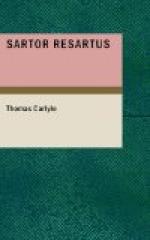Few strangers, as above hinted, had admittance hither: the only one we ever saw there, ourselves excepted, was the Hofrath Heuschrecke, already known, by name and expectation, to the readers of these pages. To us, at that period, Herr Heuschrecke seemed one of those purse-mouthed, crane-necked, clean-brushed, pacific individuals, perhaps sufficiently distinguished in society by this fact, that, in dry weather or in wet, “they never appear without their umbrella.” Had we not known with what “little wisdom” the world is governed; and how, in Germany as elsewhere, the ninety-and-nine Public Men can for most part be but mute train-bearers to the hundredth, perhaps but stalking-horses and willing or unwilling dupes,— it might have seemed wonderful how Herr Heuschrecke should be named a Rath, or Councillor, and Counsellor, even in Weissnichtwo. What counsel to any man, or to any woman, could this particular Hofrath give; in whose loose, zigzag figure; in whose thin visage, as it went jerking to and fro, in minute incessant fluctuation,—you traced rather confusion worse confounded; at most, Timidity and physical Cold? Some indeed said withal, he was “the very Spirit of Love embodied:” blue earnest eyes, full of sadness and kindness; purse ever open, and so forth; the whole of which, we shall now hope, for many reasons, was not quite groundless. Nevertheless friend Teufelsdrockh’s outline, who indeed handled the burin like few in these cases, was probably the best: Er hat Gemuth und Geist, hat wenigstens gehabt, doch ohne Organ, ohne Schicksals-Gunst; ist gegenwartig aber halb-zerruttet, halb-erstarrt, “He has heart and talent, at least has had such, yet without fit mode of utterance, or favor of Fortune; and so is now half-cracked, half-congealed.”—What the Hofrath shall think of this when he sees it, readers may wonder; we, safe in the stronghold of Historical Fidelity, are careless.




